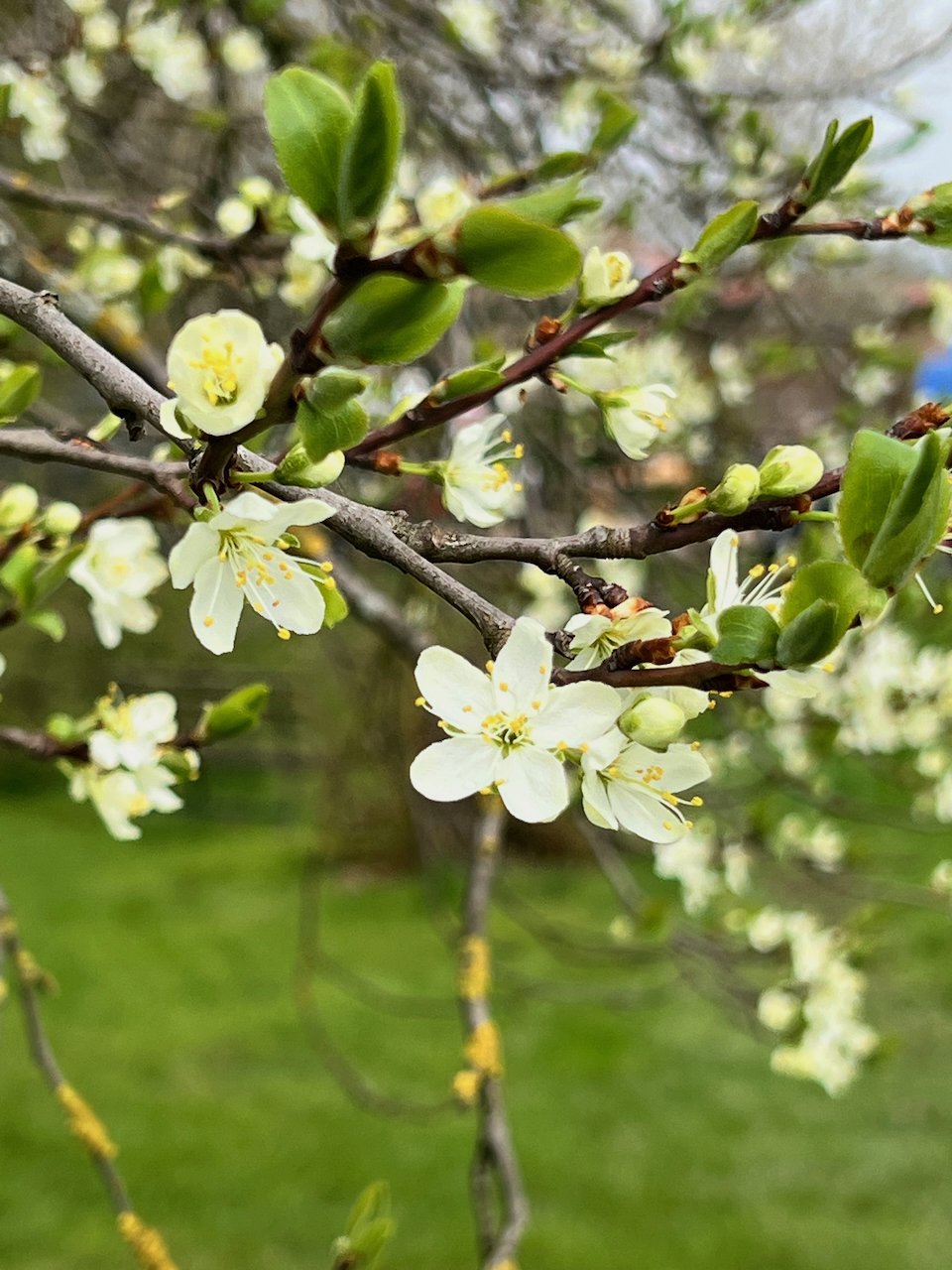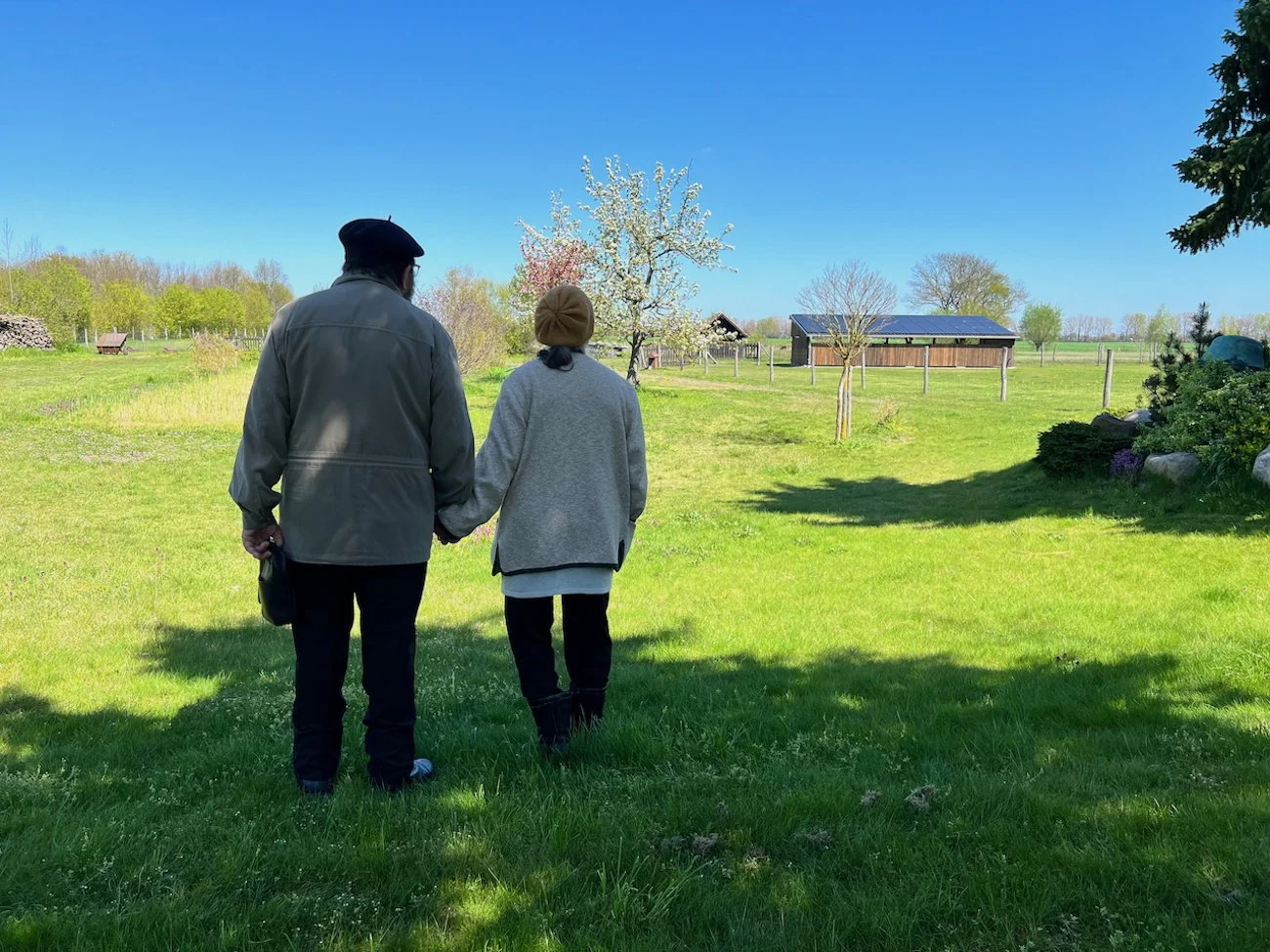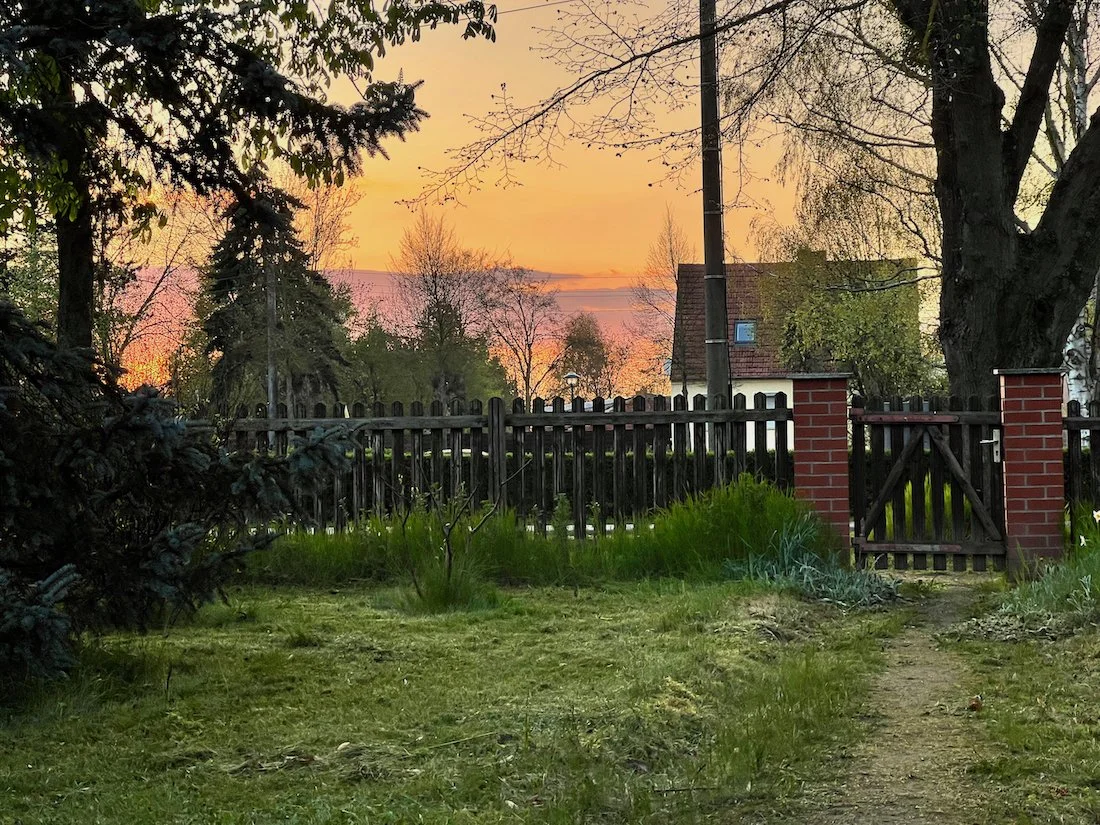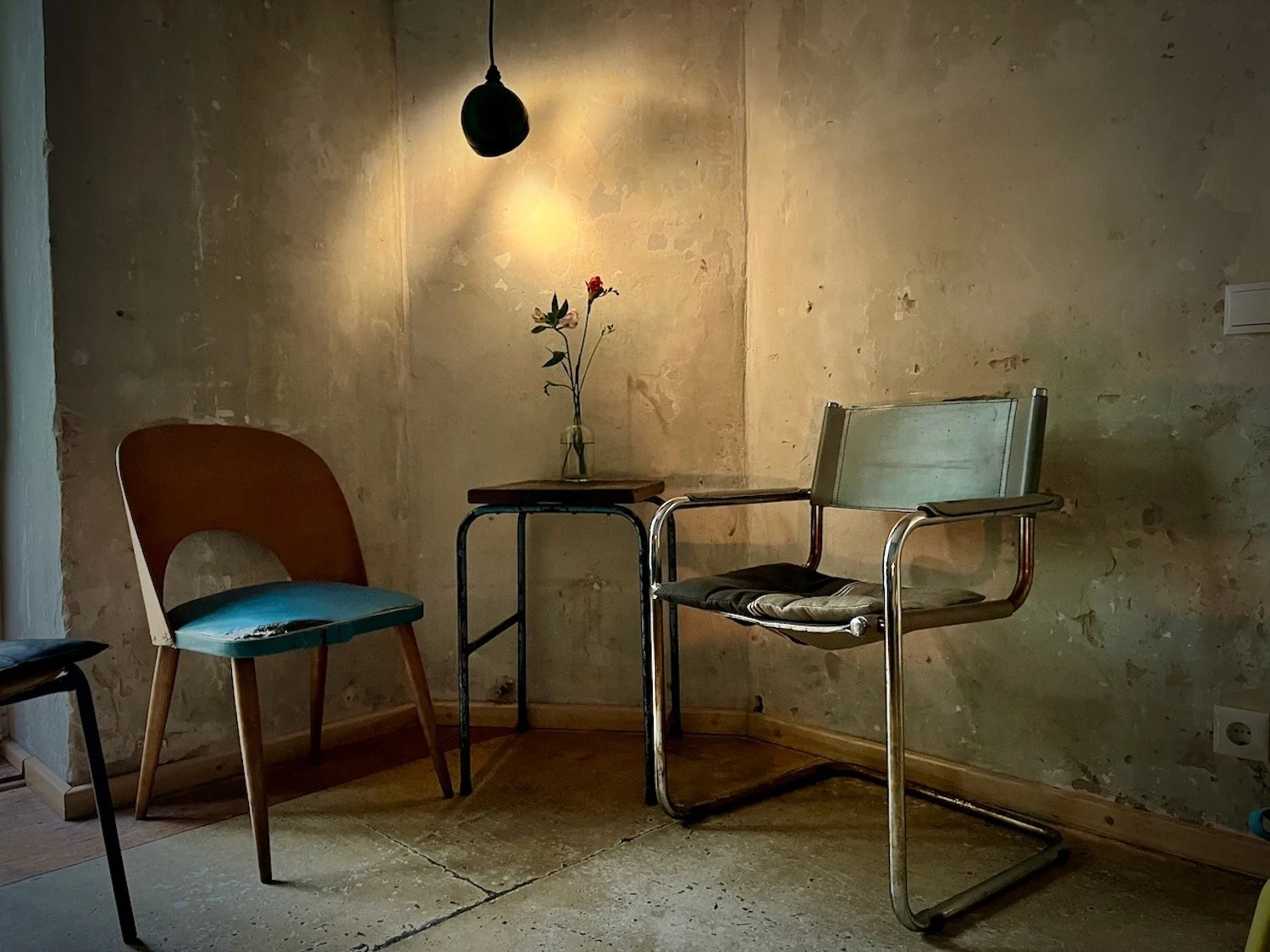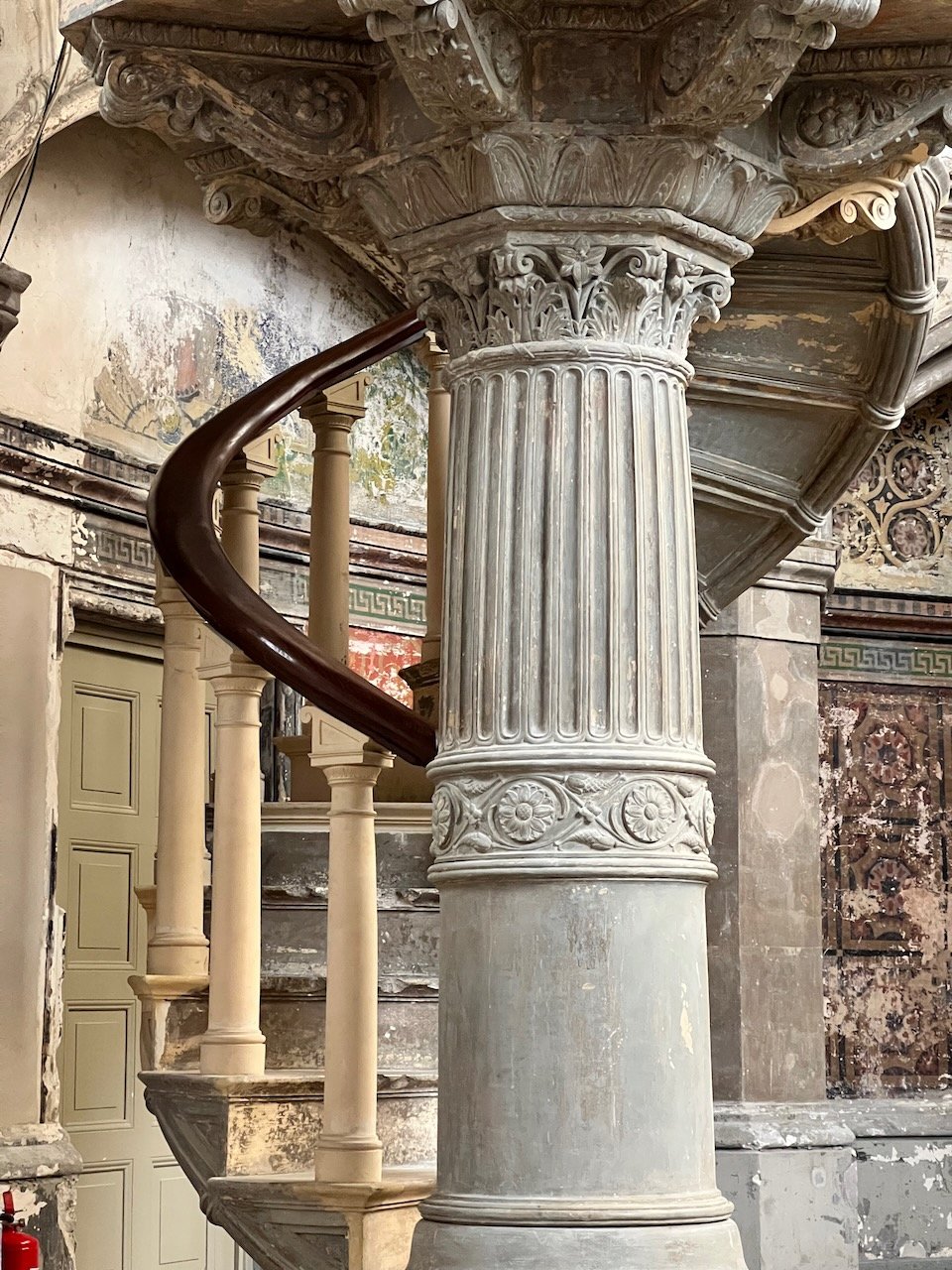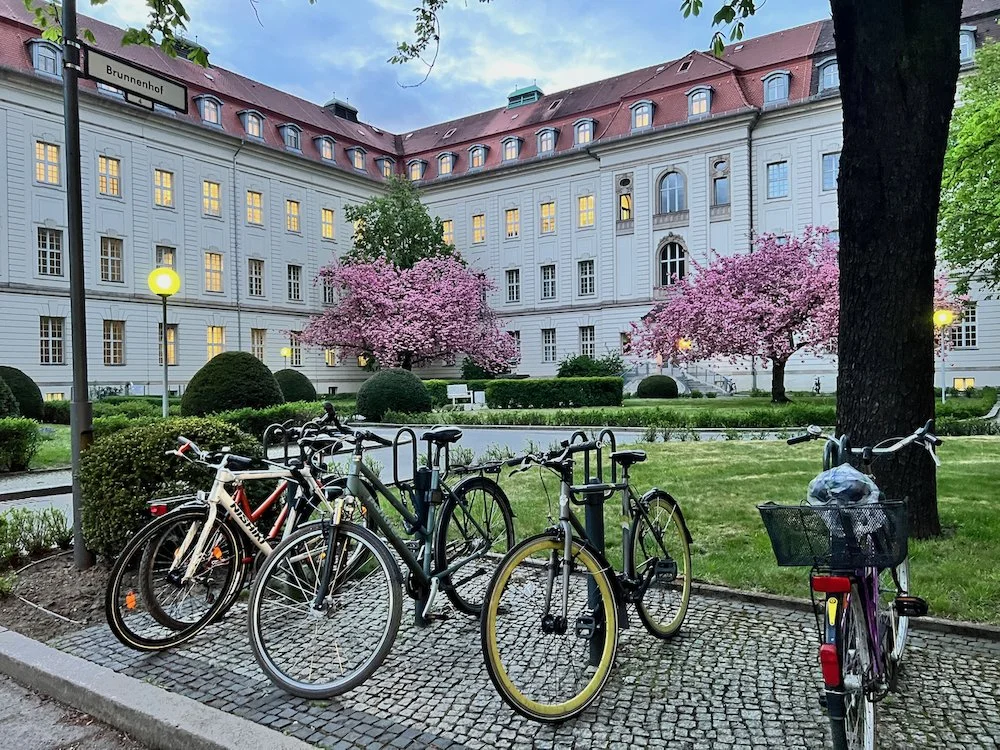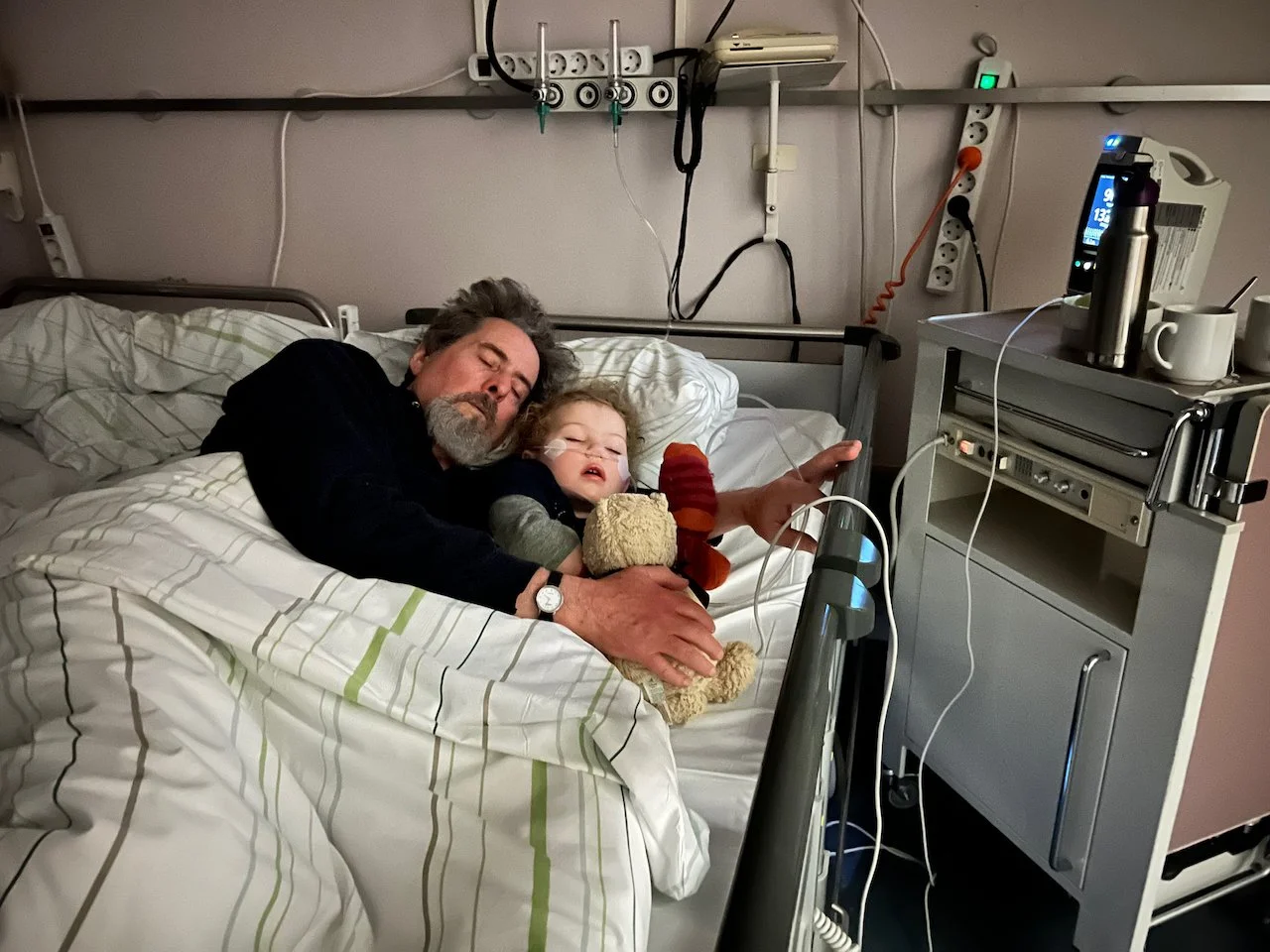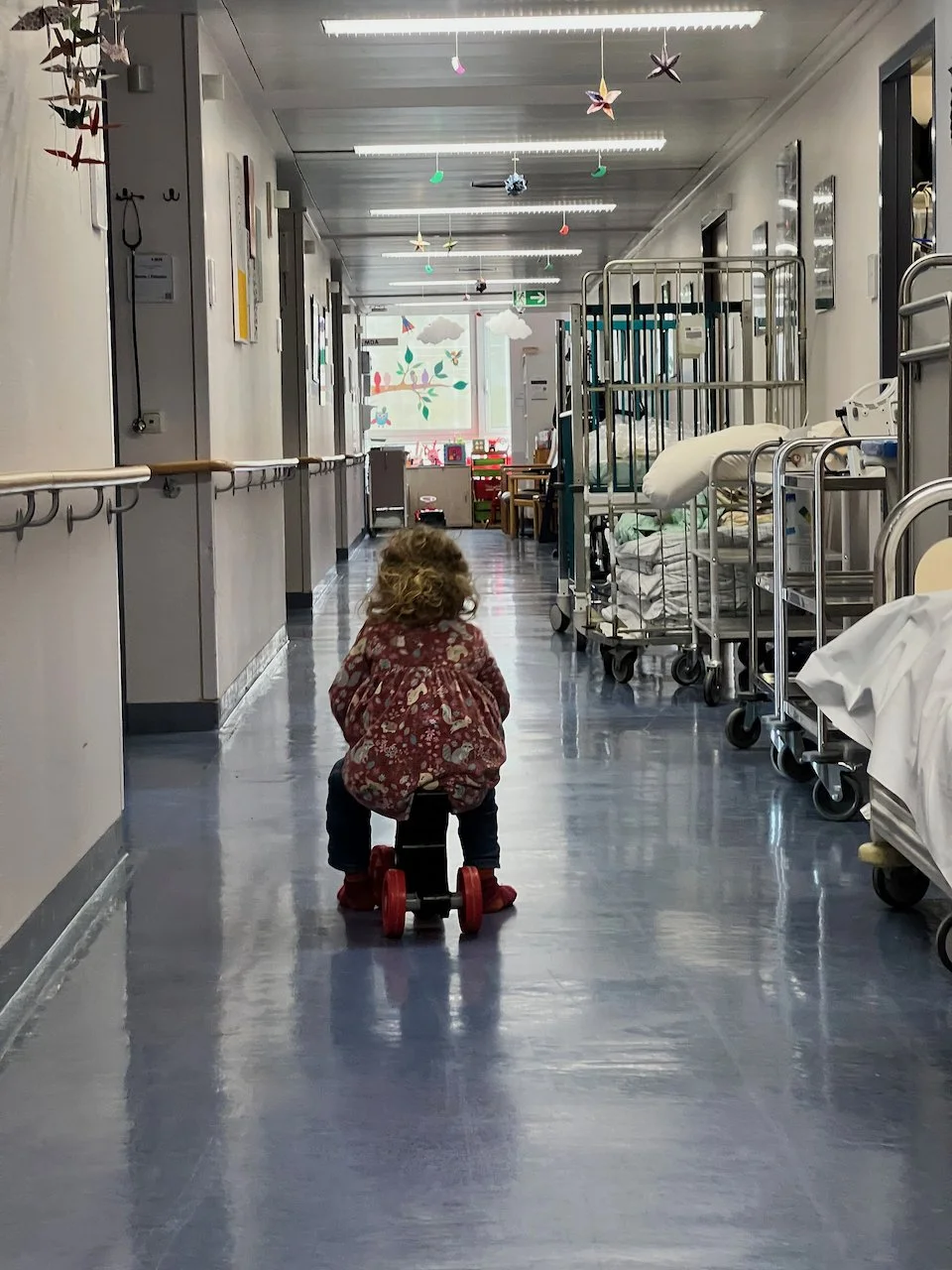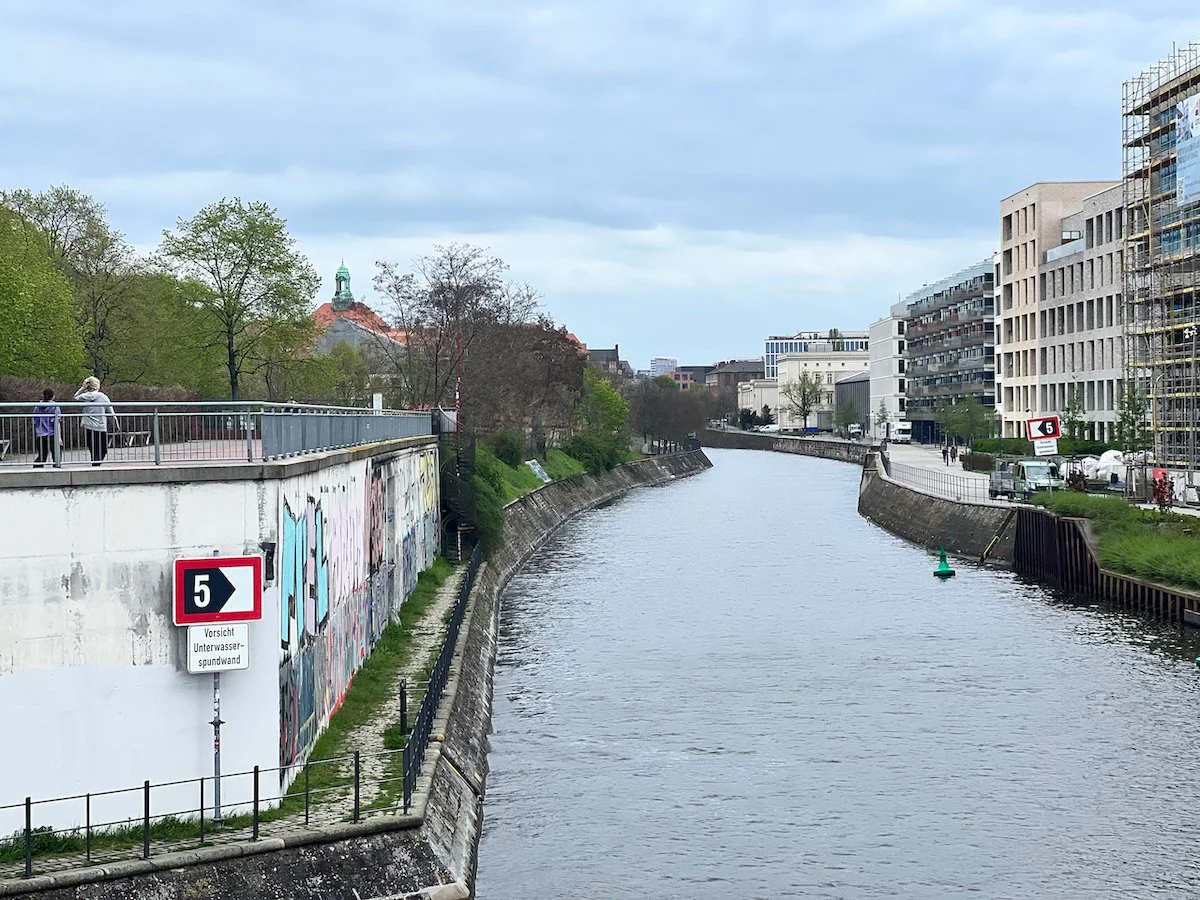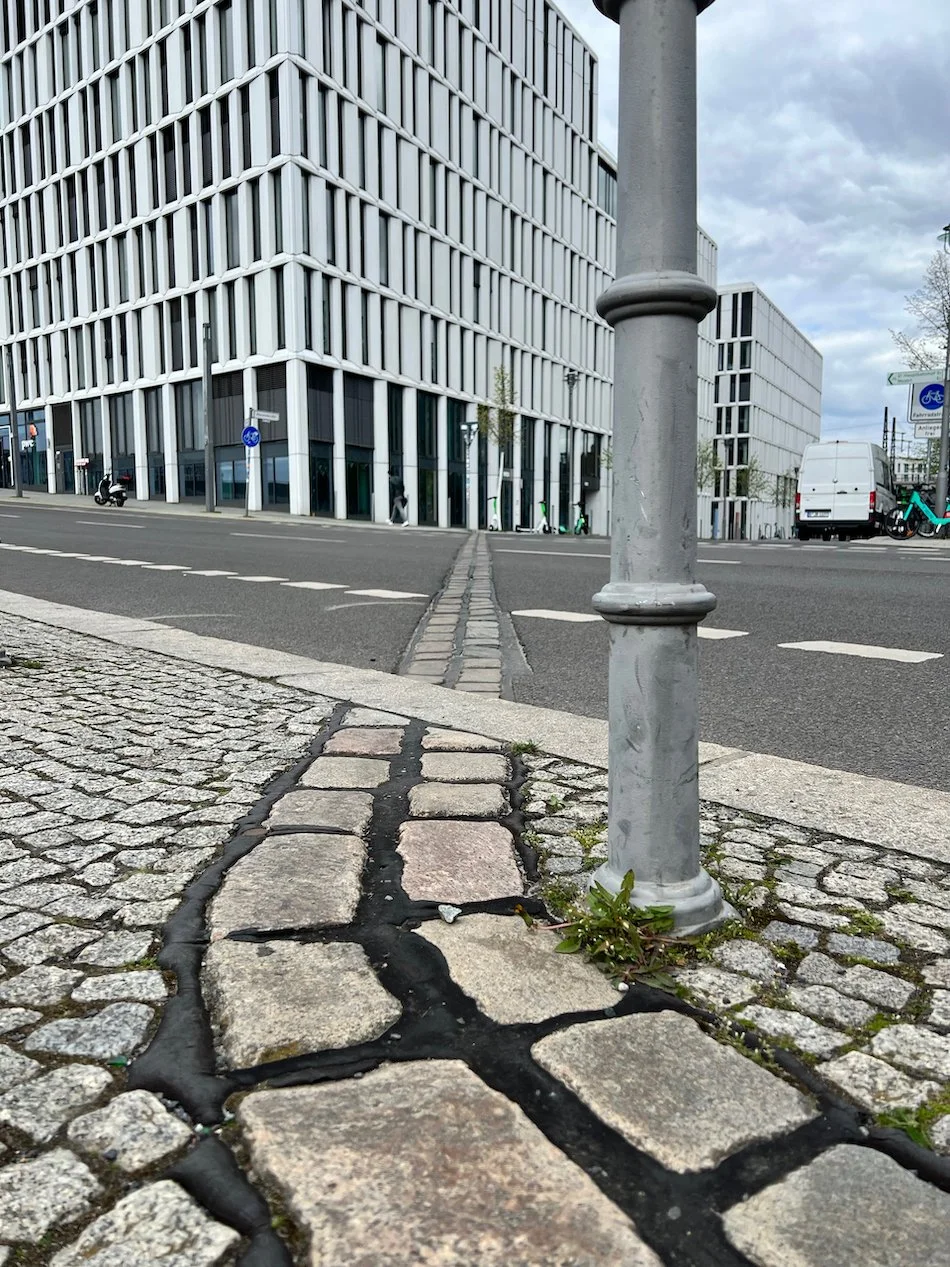Friends,
We send Spring greetings to you from a little parsonage in the state of Brandenburg, Germany, where I grew up as a child. The endless yards in the front and back of the home are brimming with viriditas, the greening life force the medieval Abbess Hildegard of Bingen has described so vividly. Everything is exploding into greening, most certainly the grass which has quickly overgrown the many gardens my father had planted and cared for so meticulously for so many years.
Now, my parents have grown old in the parsonage of my childhood, my mother has drifted into the graceful awkward joy of mid-stage Alzheimer’s where space and time begin to blur but where she still participates in family life at home.
My parents looking over the country side. (c) AF
Looking back at two programs:
The liturgical calendar still celebrates Easter, the season of new awakening and life everlasting. To begin the season, we journeyed with an intimate group here at our Cloister Seminars through passion week, being consoled by the lyrics and music of JS Bach’s Passion. I am always grateful for companions on the journey and I am strengthened by learning what you carry through these times. If you are in need of consolation you can find our Passion Week archives right here.
A week later we held a Spring retreat here at the city cloister of Berlin, studying and contemplating Hildegard’s concept of “Viriditas.” The group was a mix of beginners and those deeply acquainted with some aspect of her work. One member, for instance, graced our Sunday morning prayer with an astounding performance, from memory, of one of Hildegard’s hymns. For three days, we shared our knowledge and love of Hildegard’s work, with the conversations drawn together by presentations spanning Hildegard’s systematic theology, visions, and illuminations.
Today we offer you another series of fragments
from this psychologist turned philosopher turned wisdom seeker: clumsy morsels, but nonetheless nourishing.
1) The first is a note about our attempt to live in community and our unanticipated discovery that our social skills have become quite rusty. Fortunately, as monastic wisdom has it, there is always a getting up after a falling down.
2) The second note ponders the delightful irony of how we found retreat and a way back to inner peace in, of all places, the emergency room of a hospital. It not only gave us the unexpected gift of loving care but also of redeeming history.
3) Then at the end, we will stumble into a blessing.
Thank you for being our reader. Thank you for sharing our writing with others and your thoughts with us. And, especially, thank you for walking with us the dusty road of existential contemplation.
Love and blessings from Germany, Almut & Chuck and little one
Twilight over the parsonage. (c) AF
#1 Life Together.
On falling down and getting up
Have you tried to serve too many projects at the same time? We just have. And we got burned and almost burned out. There is a saying in the monastic world that much of monastic life is falling down and then getting up. And friends, fall we did.
Trying to immerse ourselves into community living was much harder than we thought. Some might have been our post-COVID blues: the difficult transition to social life after isolation. Some, that we did not give ourselves the easiest task by starting in the busy city of Berlin with a busy work and family schedule and too many goals we wanted to achieve. Instead of concentrating on one place and one community we found ourselves confronted with the duties, needs and expectations in several communities. While exploring the monastic life and work at a monastery, we also felt pulled to see my aging parents in the country side, all while introducing Hannah to German day care, keeping up our work here at the online cloister, and also working on Chuck’s sabbatical research (wait for the irony: the topic is “humility”…). And we have not yet even mentioned culture shock, big city life and German grumpiness :-)
Thus, our monastic year has turned into quite an odd experience. Stumbling between idealization and reality, needs and boundaries we did not do anything particularly well. Trying to serve too many simultaneous expectations, we ended up falling short in each of them. As we tried to fix it we added even more commitments and frustration. The hardest thing was not only to admit that we fell short, but that we failed ourselves on the way.
Still life at a Berlin Bar before the rush. (c) AF
Bonhoeffer wrote in his famous Life together:
one cannot live in community when one cannot live alone.
and
one cannot live alone when one cannot live in community.
We now better understand his point. Bonhoeffer came to these insights after he had immersed himself in monastic life at the Benedictine monastery of Ettal in the foothills of the Alps. He points to a fine tuned balance which one must practice daily and constantly adjust. We each need time alone and times together. And it does not matter so much if you live in a community of two or twenty, in communion with people or with an animal companion. We cannot appropriately meet expectations when we start loosing ourselves in them.
Community living offers a mirror to look in and you will also be a mirror for those in the community. You will see things about yourself you might not want to know and about others.
This is difficult, since all are looking at (and through) the shadows and dark places of their own spiritual journey, and of their own shortcomings. We each create expectations for each other and we each meet or fail them. It is difficult to understand the tangled web and to see both the other and ourselves clearly.
St. Benedict (author of the rule for all Benedictine communities) felt the hardest part of community living is to ask for forgiveness and to forgive. And so the only line from the Lord’s Prayer that he required be publicly said daily was about this. A deeper truth is that it is also hard to forgive ourselves for our short comings. And for this reason we so often avoid recognizing them. We (and we expect you also) are still working on this part. Community is the mirror that both requires forgiveness and makes it possible.
Still life at Zionskirche, Berlin. (c) AF
A wise (and delightfully ironic) monk from St. John’s Abbey once quipped to Chuck that he loved everything about living in the monastery, except for the other people. Monastic life is not romantic. It needs constant repair and adjustment, whether you live in a community of two or twenty. And one might never be able to adjust to some tensions.
So for the last three months of our stay in Germany, we decided to slow down and to find focus. It might mean we will disappoint people and expectations. But hopefully it will prevent us from further loosing ourselves on the way. We will fall down, and we will get up, forgiving both ourselves and the other.
Some questions for you:
What are the duties you have taken on? What are the places you serve? Does it give you enough time to retreat into yourself?
Are you finding yourself in relationships which need adjustment as your energies and possibilities have changed over time?
+++
Virchow Clinic of Berlin. (c) AF
#2 When good comes out of bad.
Finding retreat in the oddest of places
And so we found ourselves in the need of a breather. And it came unexpectedly when Hannah began, after the umpteenth kindergarten illness, to find it difficult to breathe. When our little one developed breathing problems during another viral infection we rushed her to the hospital.
Once there, she was stabilized in the emergency room, and we were recommended to stay in the hospital for a few days for observation. Here our story took a turn toward the better. We were gently and thoughtfully cared for. No complicated expectations, and unconditional regard.
Resting at a long night in the ER.
It was not about how much we engaged or how much we helped. It was just being cared for. We had been blessed with a family room right there in the famous Rudolf-Virchow-Clinic in Berlin. Fortunately Hannah’s illness was not life threatening and with some oxygen she recovered quickly. We took a big girl, one who had braved the tubes and punctures of hospital life, back from the Hospital.
CG Jung’s wisdom encourages us to read the meanings of our day to day life. We found it quite remarkable that just when we could not breathe anymore, we found the space to breathe in the lung diseases wing of a famous hospital.
Cranes and our recovering girl at the hospital halls.
So, on the cool sunny morning when they let us out, we decided to enjoy the fresh Spring air and walk several miles home through the busy city. As it happened, the broad stone archway of the German Renaissance hospital administration building led us onto a street that ended at a lovely canal. We walked along the tree-lined pathway through neighborhoods and eventually to a graveyard that was the site of early tragedy along the Berlin Wall. Hannah fell asleep in the carriage, giving us time and quiet to linger thoughtfully. After contemplating these things, we walked further down the canal all the way to the Spree, the central river that divides the city. Every where we stumbled upon the remnants of the Berlin Wall. either some pieces itself, or historic markers on the street or signs an stories along the way.
The Spree channel, once dividing East and West Berlin. (c) AF
#3. A blessing for your stumbling
We stumble through our lives like toddlers,
sometimes falling on the soft cushion of our flesh,
more often rising with bumps and bruises
Occasionally surprised by real injury
or cuts that will not heal
or sickness borrowed or inherited from others
Always refreshed by the blooming of Spring,
and friendships, and the deep medicine of food
Look back and forward!
Weave a narrative of hope and
shape a story of accidental falls
and the surprising joy that
still
we get up and walk.
May you be blessed
in your falling and rising
as you stumble and right yourself,
and others,
step by hopeful step.
CH
Where the Berlin Wall once stood. (c) AF


